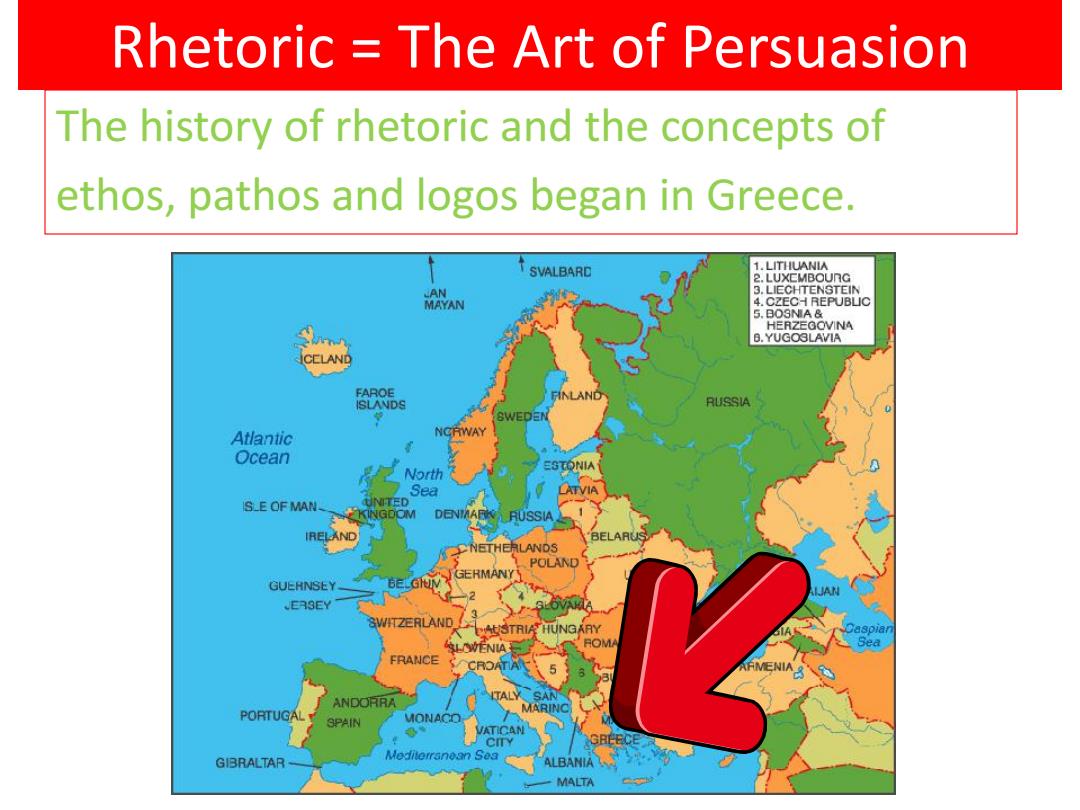
Rhetoric The Art of Persuasion The history of rhetoric and the concepts of ethos,pathos and logos began in Greece. SVALBARD 1.LITHUANIA 2.LUXEMBOUnG N 3.LIECHTENSTEIN 4.CZECH REPUBLIC 5.BOSNA& HERZEGOVINA B.YUGOBLAVIA CELAND RUSSIA Atlantic Ocean North Sea IS_E OF MAN- KINGDOM D日NIMA RAND BELAR POLAND GUEHNSEY JER3EY SWITZERLAND AUSTRIA HUNGARY ea FRANCE ANDORRA MARINC PORTUGAL SPAIN MONACO GIBRALTAR Mediterrsnean Sea ALBANIA MALTA
Rhetoric = The Art of Persuasion The history of rhetoric and the concepts of ethos, pathos and logos began in Greece
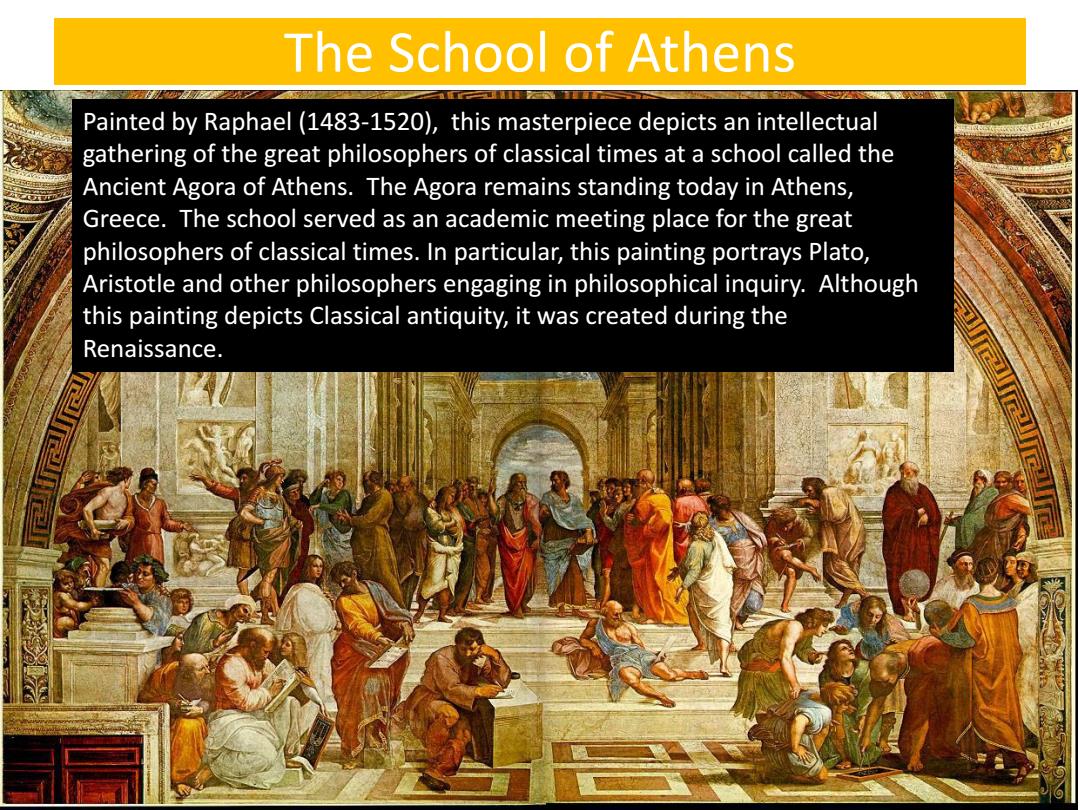
The School of Athens Painted by Raphael(1483-1520),this masterpiece depicts an intellectual gathering of the great philosophers of classical times at a school called the Ancient Agora of Athens.The Agora remains standing today in Athens, Greece.The school served as an academic meeting place for the great philosophers of classical times.In particular,this painting portrays Plato, Aristotle and other philosophers engaging in philosophical inquiry.Although this painting depicts Classical antiquity,it was created during the Renaissance
The School of Athens Painted by Raphael (1483-1520), this masterpiece depicts an intellectual gathering of the great philosophers of classical times at a school called the Ancient Agora of Athens. The Agora remains standing today in Athens, Greece. The school served as an academic meeting place for the great philosophers of classical times. In particular, this painting portrays Plato, Aristotle and other philosophers engaging in philosophical inquiry. Although this painting depicts Classical antiquity, it was created during the Renaissance
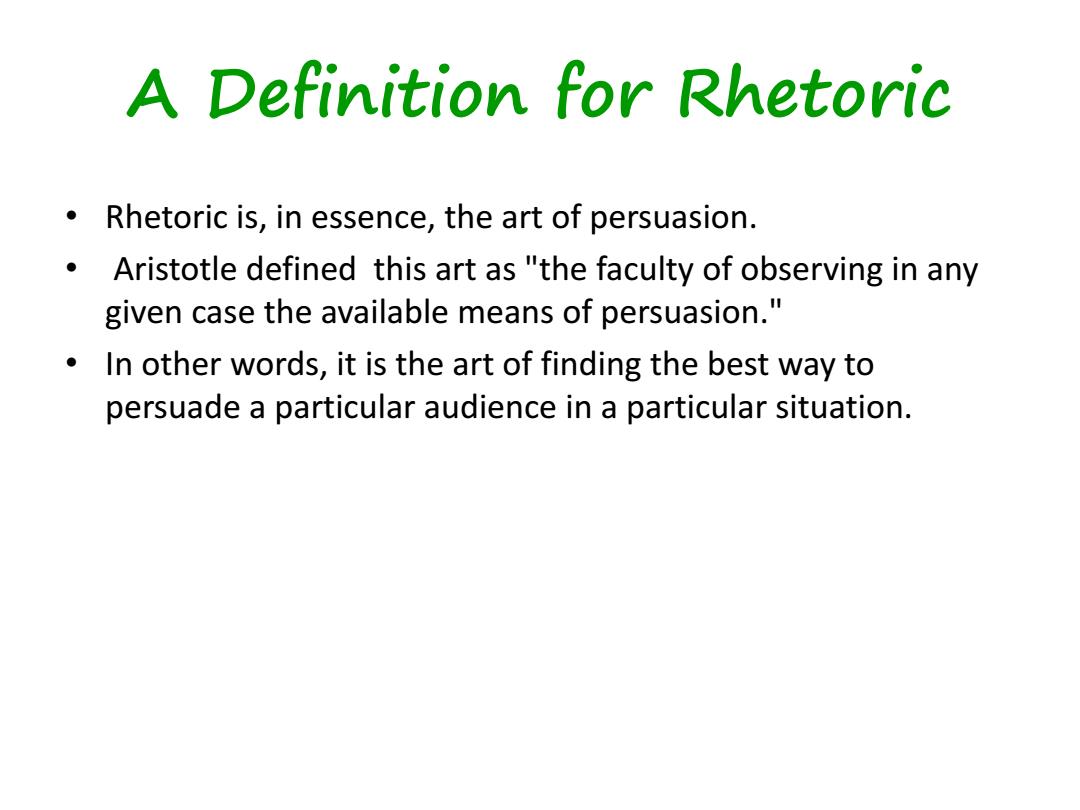
A Definition for Rhetoric Rhetoric is,in essence,the art of persuasion. Aristotle defined this art as "the faculty of observing in any given case the available means of persuasion." In other words,it is the art of finding the best way to persuade a particular audience in a particular situation
A Definition for Rhetoric • Rhetoric is, in essence, the art of persuasion. • Aristotle defined this art as "the faculty of observing in any given case the available means of persuasion." • In other words, it is the art of finding the best way to persuade a particular audience in a particular situation
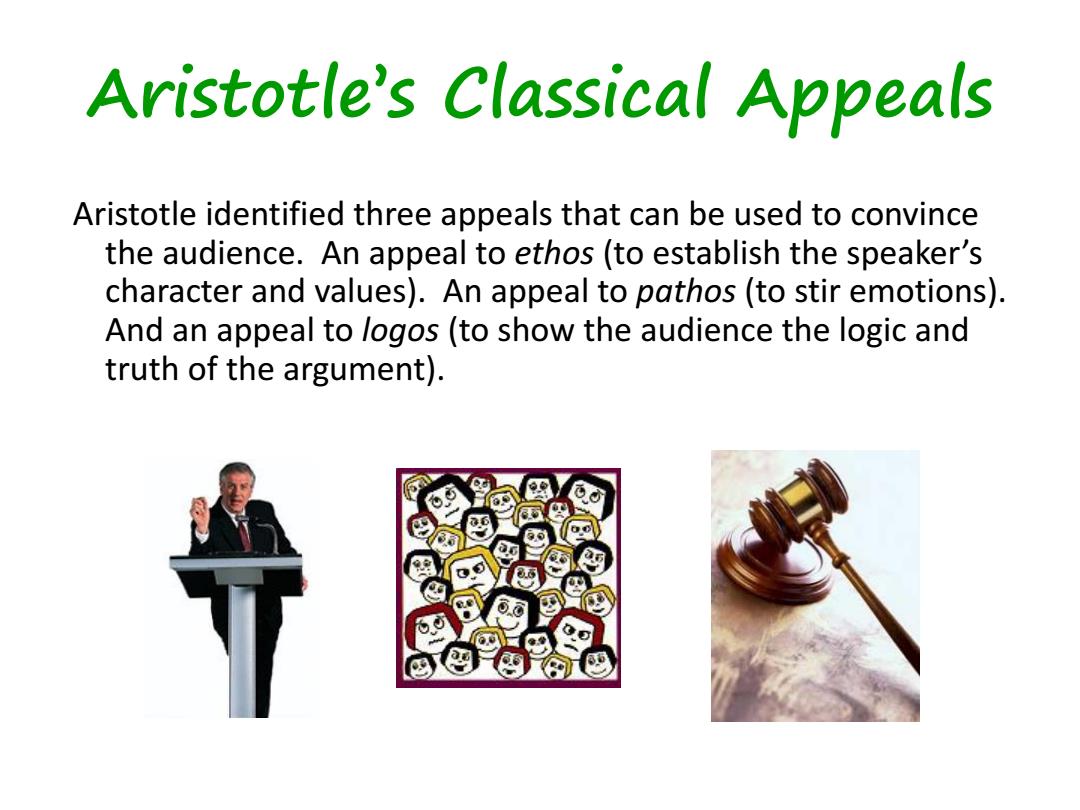
Aristotle's Classical Appeals Aristotle identified three appeals that can be used to convince the audience.An appeal to ethos(to establish the speaker's character and values).An appeal to pathos(to stir emotions). And an appeal to logos(to show the audience the logic and truth of the argument)
Aristotle’s Classical Appeals Aristotle identified three appeals that can be used to convince the audience. An appeal to ethos (to establish the speaker’s character and values). An appeal to pathos (to stir emotions). And an appeal to logos (to show the audience the logic and truth of the argument)
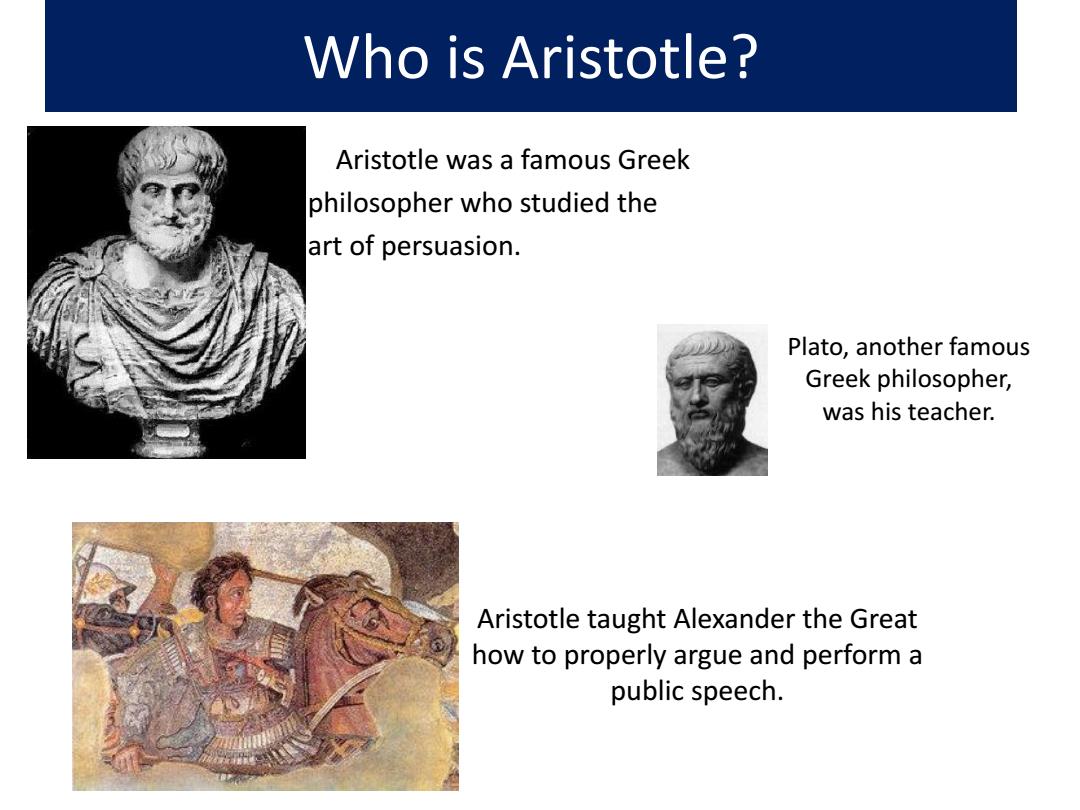
Who is Aristotle? Aristotle was a famous Greek philosopher who studied the art of persuasion. Plato,another famous Greek philosopher, was his teacher. Aristotle taught Alexander the Great how to properly argue and perform a public speech
Who is Aristotle? Aristotle was a famous Greek philosopher who studied the art of persuasion. Aristotle taught Alexander the Great how to properly argue and perform a public speech. Plato, another famous Greek philosopher, was his teacher
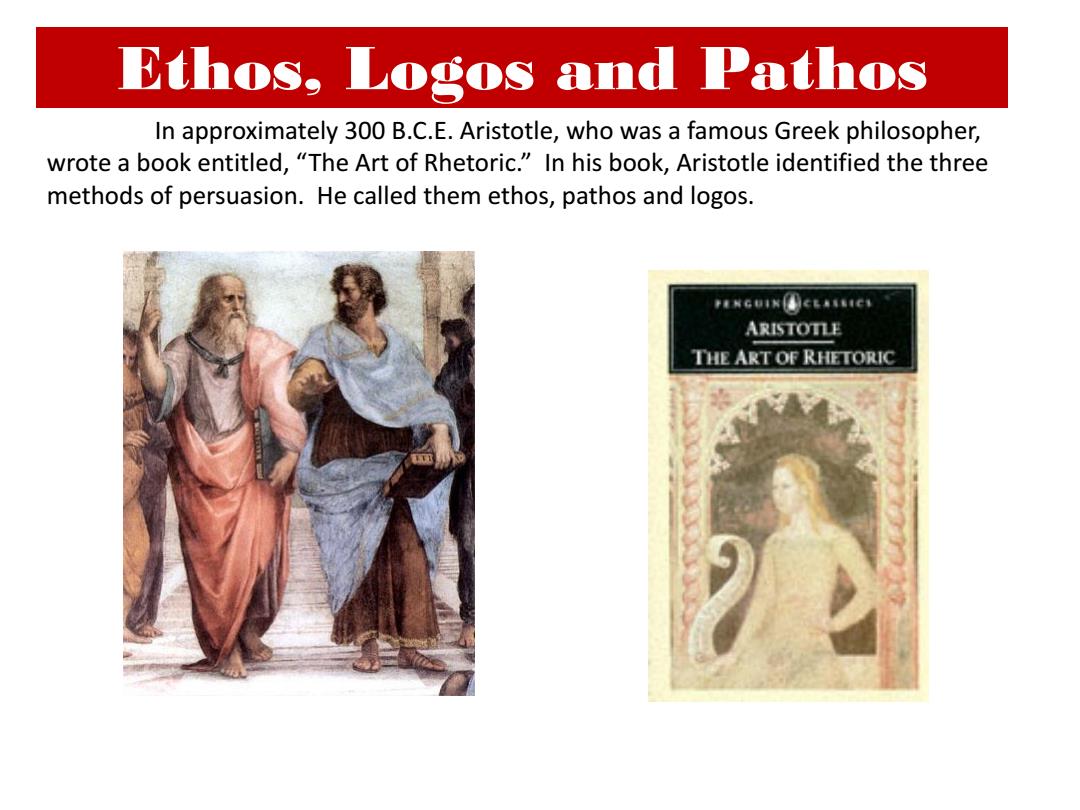
Ethos,Logos and Pathos In approximately 300 B.C.E.Aristotle,who was a famous Greek philosopher, wrote a book entitled,"The Art of Rhetoric."In his book,Aristotle identified the three methods of persuasion.He called them ethos,pathos and logos. FENGUINCEASNICS ARISTOTLE THE ART OF RHETORIC
Ethos, Logos and Pathos Aristotle Plato In approximately 300 B.C.E. Aristotle, who was a famous Greek philosopher, wrote a book entitled, “The Art of Rhetoric.” In his book, Aristotle identified the three methods of persuasion. He called them ethos, pathos and logos. The Man The Book

Ethos,Pathos and Logos 1. Ethos an ethical or moral argument 2. Pathos an emotional argument 3. Logos a logical argument
Ethos, Pathos and Logos 1. Ethos = an ethical or moral argument 2. Pathos = an emotional argument 3. Logos = a logical argument
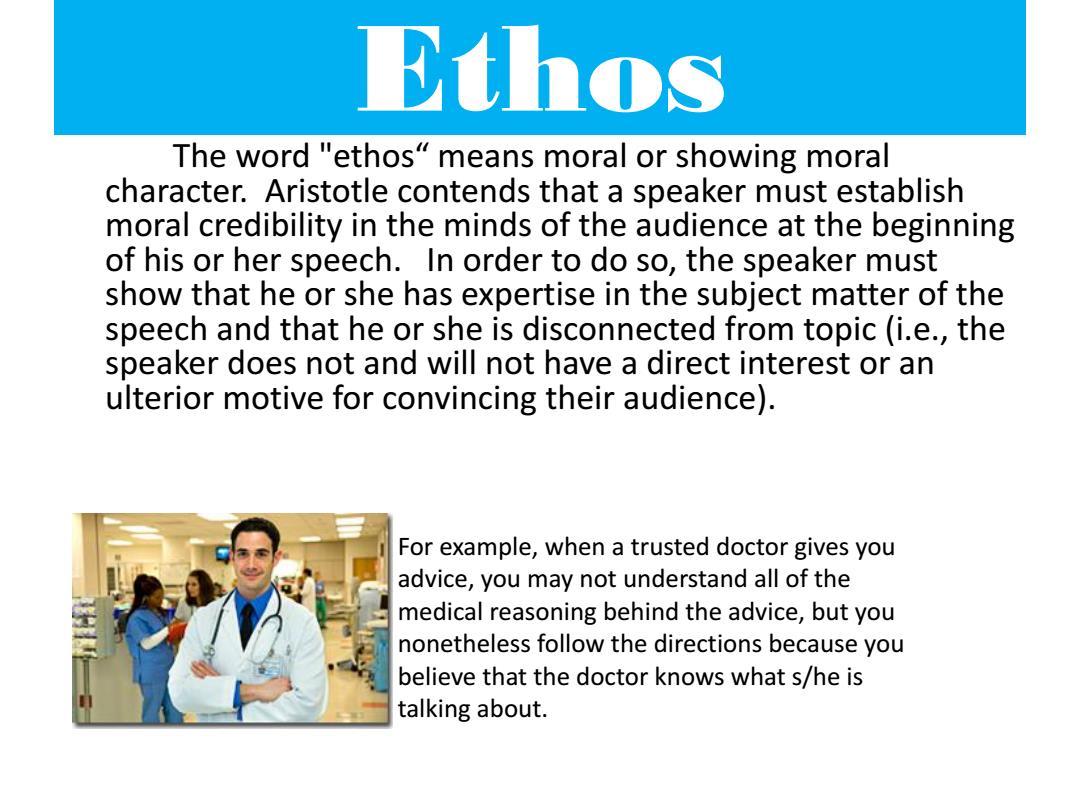
Ethos The word "ethos"means moral or showing moral character.Aristotle contends that a speaker must establish moral credibility in the minds of the audience at the beginning of his or her speech.In order to do so,the speaker must show that he or she has expertise in the subject matter of the speech and that he or she is disconnected from topic (i.e.,the speaker does not and will not have a direct interest or an ulterior motive for convincing their audience). For example,when a trusted doctor gives you advice,you may not understand all of the medical reasoning behind the advice,but you nonetheless follow the directions because you believe that the doctor knows what s/he is talking about
Ethos The word "ethos“ means moral or showing moral character. Aristotle contends that a speaker must establish moral credibility in the minds of the audience at the beginning of his or her speech. In order to do so, the speaker must show that he or she has expertise in the subject matter of the speech and that he or she is disconnected from topic (i.e., the speaker does not and will not have a direct interest or an ulterior motive for convincing their audience). For example, when a trusted doctor gives you advice, you may not understand all of the medical reasoning behind the advice, but you nonetheless follow the directions because you believe that the doctor knows what s/he is talking about
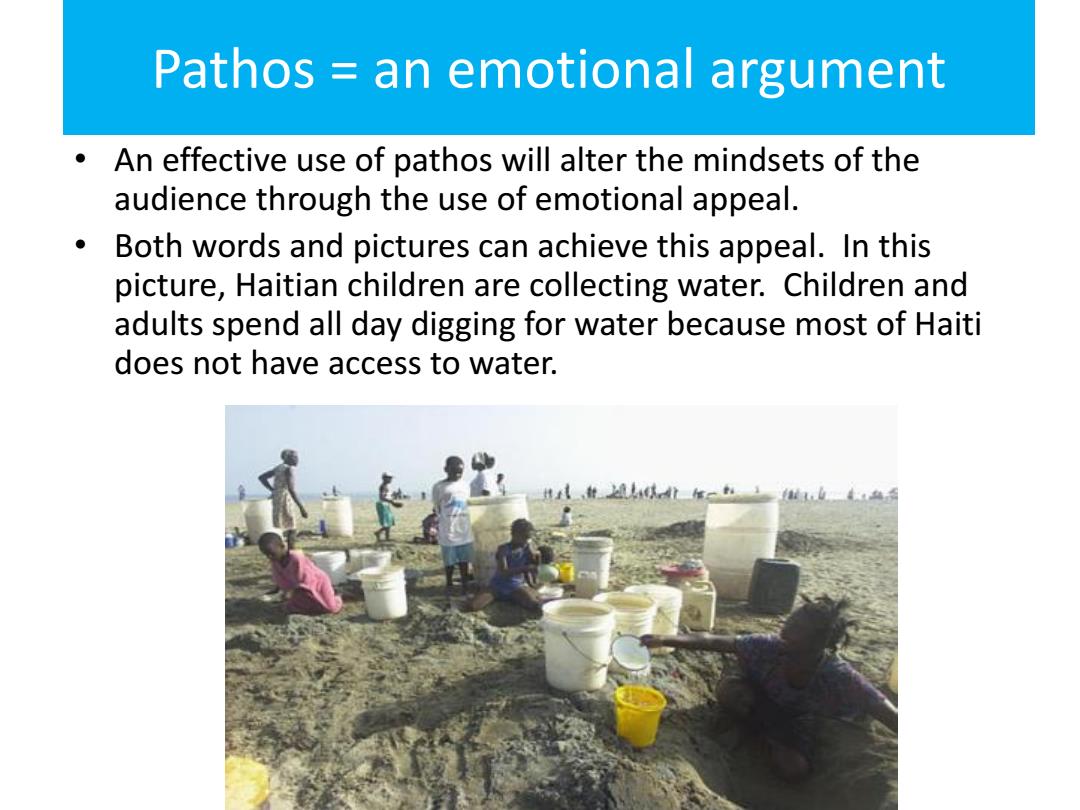
Pathos an emotional argument An effective use of pathos will alter the mindsets of the audience through the use of emotional appeal. Both words and pictures can achieve this appeal.In this picture,Haitian children are collecting water.Children and adults spend all day digging for water because most of Haiti does not have access to water
Pathos = an emotional argument • An effective use of pathos will alter the mindsets of the audience through the use of emotional appeal. • Both words and pictures can achieve this appeal. In this picture, Haitian children are collecting water. Children and adults spend all day digging for water because most of Haiti does not have access to water
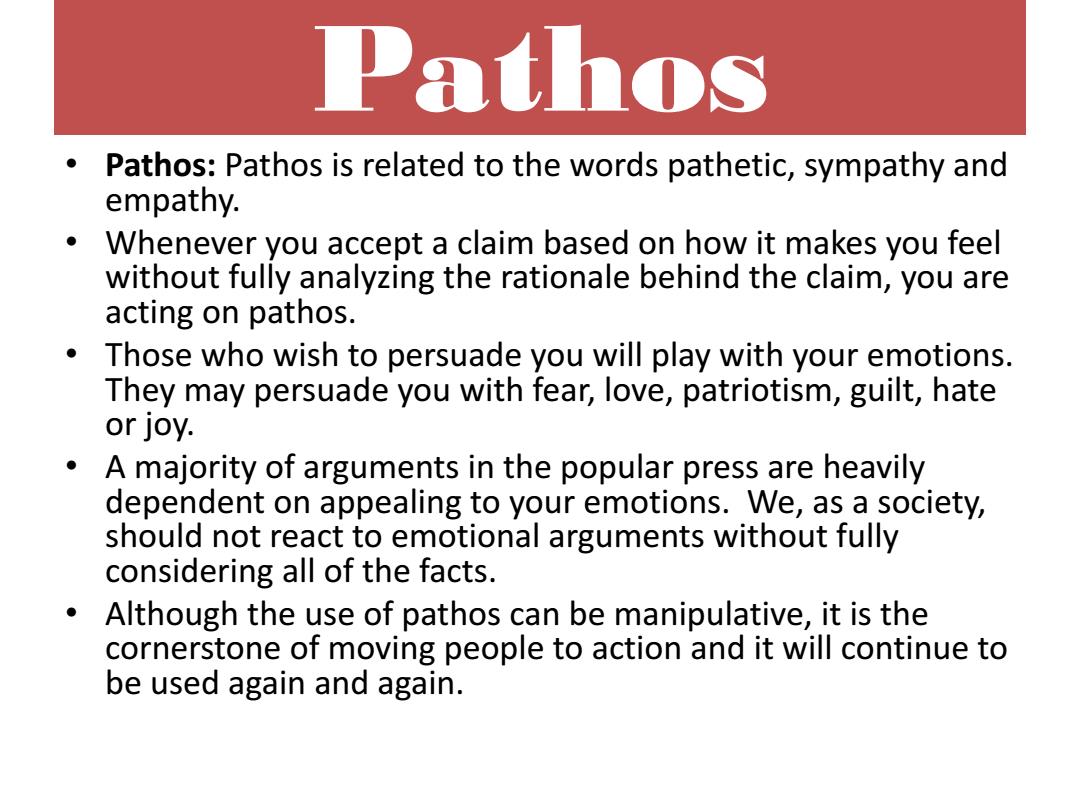
Pathos Pathos:Pathos is related to the words pathetic,sympathy and empathy. Whenever you accept a claim based on how it makes you feel without fully analyzing the rationale behind the claim,you are acting on pathos. Those who wish to persuade you will play with your emotions. They may persuade you with fear,love,patriotism,guilt,hate or joy. A majority of arguments in the popular press are heavily dependent on appealing to your emotions.We,as a society, should not react to emotional arguments without fully considering all of the facts. Although the use of pathos can be manipulative,it is the cornerstone of moving people to action and it will continue to be used again and again
Pathos • Pathos: Pathos is related to the words pathetic, sympathy and empathy. • Whenever you accept a claim based on how it makes you feel without fully analyzing the rationale behind the claim, you are acting on pathos. • Those who wish to persuade you will play with your emotions. They may persuade you with fear, love, patriotism, guilt, hate or joy. • A majority of arguments in the popular press are heavily dependent on appealing to your emotions. We, as a society, should not react to emotional arguments without fully considering all of the facts. • Although the use of pathos can be manipulative, it is the cornerstone of moving people to action and it will continue to be used again and again